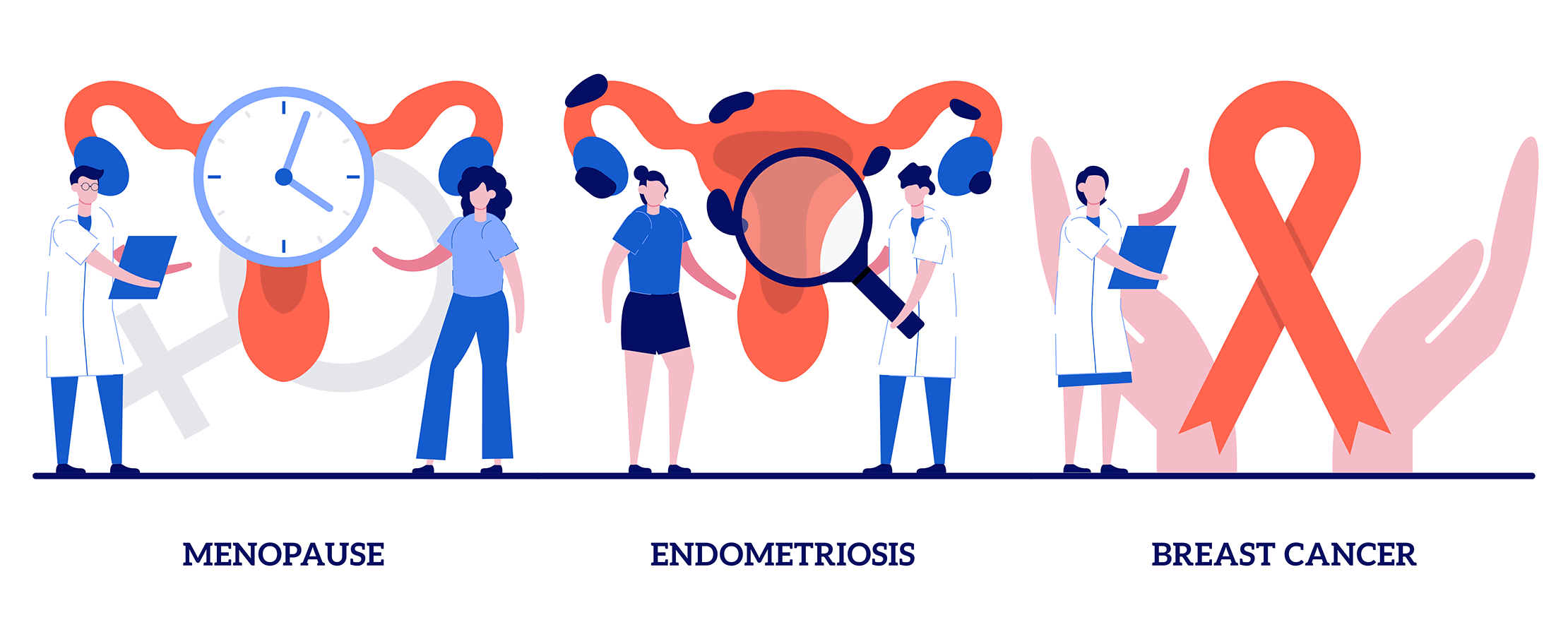
It is estimated that…
1 in 10 women worldwide
68% of young girls and women with endometriosis
82% of women are at times
30% to 50% of women with endometriosis
Symptoms include…
Constant fatigue
Painful periods
Heavy flow of menstrual blood
Pain during sexual intercourse
Difficulty in conceiving
Many young girls and women experience dysmennorhea (or painful menstrual cramps) during their monthly ordeal, but for some, it can be very disruptive to their daily routines. Menstrual cramps happen when the uterus muscles contract and it can be accompanied by pain in the lower back and pain radiating down the legs.
On the other hand, endometriosis is a condition where the uterus lining (known as endometrium) grows in places other than inside the uterus. It can grow in places like the fallopian tubes, ovaries, along the pelvic area and in some cases in the respiratory areas.
During menstrual cycle where the lining of the uterus breaks down and flow as menstrual blood, the uterus lining outside of the uterus also breaks down. But in these circumstances, there is no way out for the blood to flow and this causes accumulation of the blood to form cysts and adhesions which can affect fertility and bowel movements.
The pain of endometriosis can be more severe than the usual menstrual cramps. There is also a small population of women with endometriosis that goes undetected because they do not experience any symptoms at all, but realize they have the condition when they are unable to get pregnant, according to the National Institutes of Health.
The biggest complication of endometriosis is that it affects a woman’s fertility. Women with endometriosis may have difficulty getting pregnant. The reasons are :-
- Scarring tissues around the fallopian tubes and ovaries
- Quality of the eggs
- Blockages in the fallopian tubes and/or on ovaries
- Embryo implantation issues resulting from scarring, adhesions and damage from endometriosis
Endometriosis in Malaysia
Women is at risk of endometriosis and it may be one of the contributing factor of declining birth rates among Malaysian women. Some of women who have difficulty in conceiving exhibits signs and symptoms of endometriosis. Consequently, other women who have endometriosis experience infertility.
Many women in Malaysia choose to suffer the pain caused by endometriosis in silence because it is still considered a discouraged subject to discuss about one’s menstrual periods, given our Asian cultural background. Malaysian women or young girls sought after the use of painkillers to reduce the pain instead of seeking medical attention or proper diagnosis.
It is also important to remember that there are women with endometriosis that are able to conceive without any medical assistance, such as surgery or medication.
What can our Fertility Specialist do for you
If you suspect that you have endometriosis and have been trying to conceive for a while now, do speak to a doctor or specialist about it or make an appointment with our Fertility Specialist. The Specialist will perform the below tests to further determine the cause of your symptoms above :-
Pelvic examination using ultrasound scan
Magnetic resonance imaging (MRI)
Laparoscopy
If you do find out that you have endometriosis, the sooner you get diagnosed, the sooner your Specialist can help you make a plan to manage your symptoms.
Fertility Treatments For Endometriosis
There are a few options that you can consider overcoming endometriosis, and one of them is through Assisted Reproductive Technology (ART) services such as IVF – if you are trying to conceive. Other options would be through laparoscopic surgery and/or medications. Either way, it is important that your endometriosis is properly assessed and treated by an experienced gynaecologist or specialist.
If you suspect that you have endometriosis and have been trying to conceive for a while now, do speak to a doctor or specialist about it or make an appointment with our Fertility Specialist.
If you are interested in knowing more or have decided to get in touch with us, please call us at
Or send us your enquiry